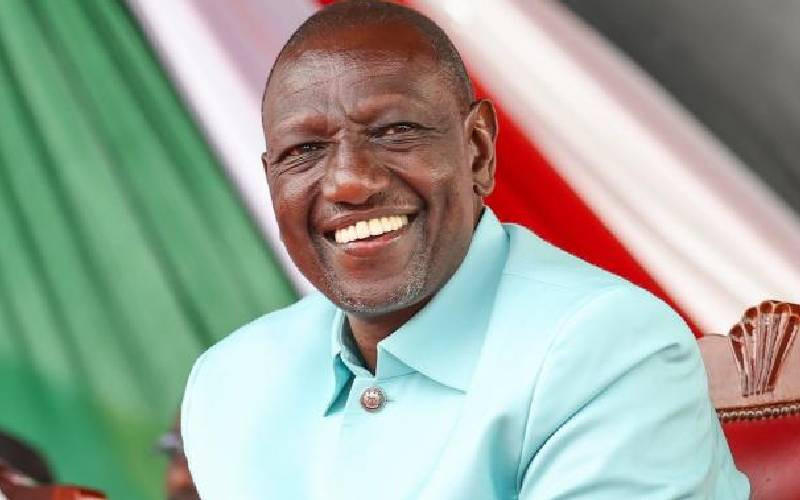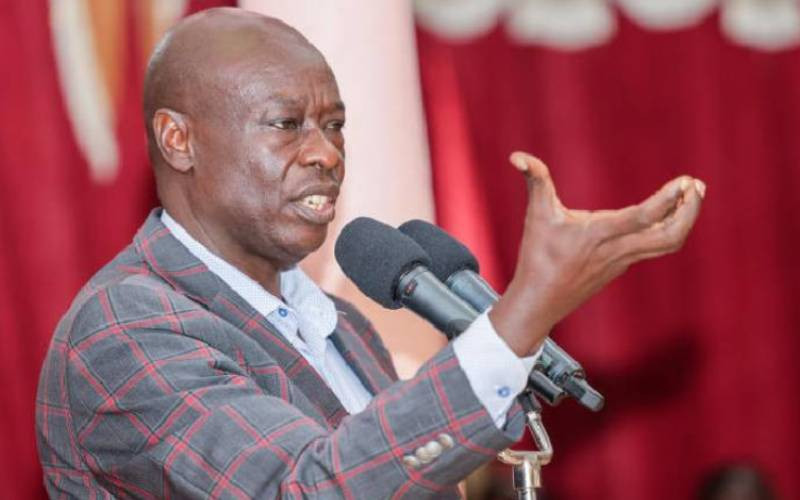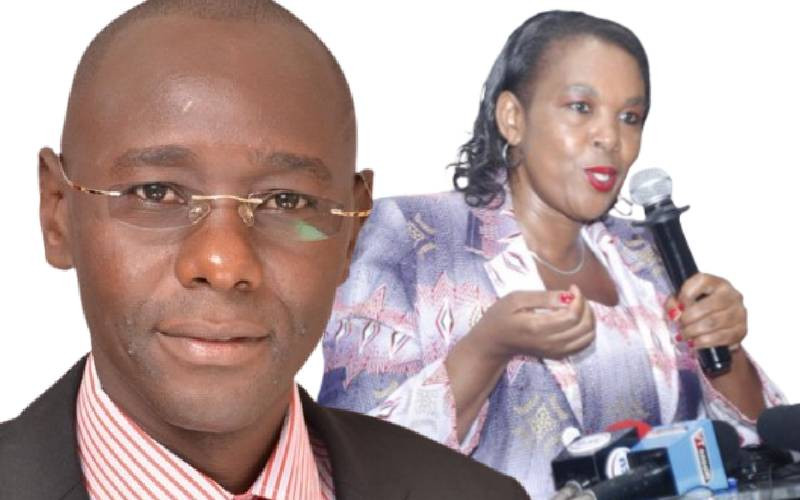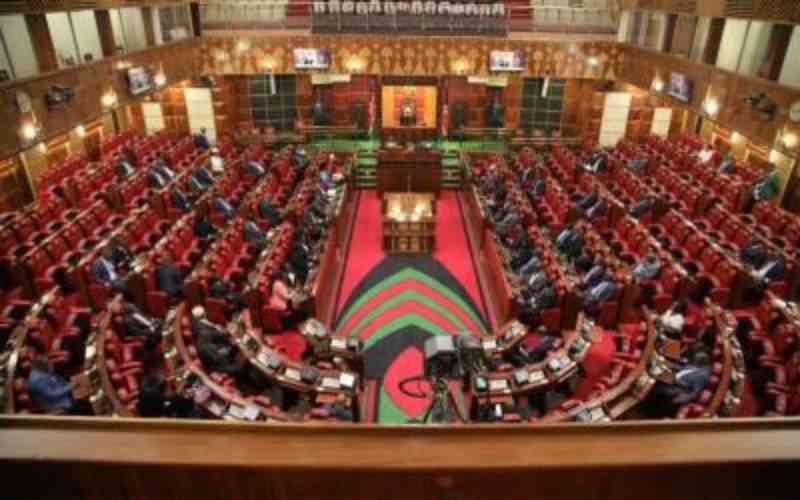
For its first year in office, President William Ruto's Kenya Kwanza administration faired pretty well in sustaining the twin 'hustler/bottom-up' narrative that propelled it to power.
In policy, word, and act, President Ruto - by and large - stuck to the narrative when forming his government, formulating its policies, selling them to Parliament and the public, and implementing them in the last 12 months of rule.
During the campaigns, the narrative sounded lofty, some would say a long con, given the very elitist structure of governments as they have been known in the country.
The bottom-up philosophy was mocked over the campaigns and derisively depicted. Even within Kenya Kwanza circles, there are those who do not understand or believe it.
"Eti bottoms-up? Hio ni slogan tu...fungua hio bottom yako tuone. Hio bottom yako iko wapi? (Bottoms-up? That's just a slogan...open that bottom of yours we see. Where is that bottom of yours?)" Ruto's main challenger at the election, Azimio leader Raila Odinga, joked about it on January 22, 2022 in Murang'a.
Before he encountered his Damascus moment, nay, an earthquake, now Prime Cabinet Secretary Musalia Mudavadi similarly mocked the narrative, describing it as mere semantics out to confuse Kenyans.
Turning a half-full bottle handed to him by Senator Johnson Sakaja, now KK's city governor, he derided the whole concept as one built on paper:
- Ruto remains mute as healthcare crisis worsens
- Government calls on KMPDU to end strike
- Ruto meets KMPDU officials, promises lasting solutions to end industrial strikes
- Ruto forms a 20-member team to audit healthcare resources
Keep Reading
"If you did this (turn the bottle upside down), and you say bottoms-up, this (the empty base) is the bottom, mtu anameza kila kitu. Na mwananchi atapata nini? And how are you going to finance this economy?"
The hustler catchphrase on the other hand was thoroughly fleshed out, and stripped bare to its illicit origins. Some said it was inciting a class war, a revolution.
While others said it was insulting to the masses, and the country as a whole.
"A hustler is a male prostitute, a swindler," the abrasive COTU leader Francis Atwoli yelled, as he rallied people to reject it.
The mockery in public rallies was complemented by equally sarcastic memes which flooded social media platforms, making fun of it all.
But Ruto stuck to it like his life depended on it, and expanded it beyond economic terms to include a political revolution where fresh faces would replace 'dynastic' ones to implement.
To shore it up against the onslaught, Ruto appointed an economic think-tank comprising of renowned economic gurus to firm it up. Long before the election, it had begun to take some serious form.
The groundswell had been built, and Ruto easily swept into power. Once in office, he initially sent mixed signals when he formed an all-familiar, mix and match Cabinet of both dynasties and hustlers.
In quick succession, he indulged in the Cabinet Administrative Secretaries (CAS) misstep whose effect, until it was quashed by the courts, was to add another layer of government functionaries between a Cabinet Secretary and Principal Secretaries.
It's been a grand disaster, says Raila on Ruto's first year
But what he lost in those moves, he compensated in the implementation of the Executive order establishing the Hustlers Fund, spreading of parliamentary and party positions to younger, fresher and self-made politicians, and a ruthless pursuit for taxes to fund his lofty ambitions.
Despite all the issues which surrounded, and continue to surround it, the launch of the Hustler's Fund was a political masterstroke.
Not only had he actually fulfilled an important election pledge to an important group, he also did so in time, when hustlers were gasping for air.
The country was sinking in debt, fuel subsidies were draining the government, and the cost of basics - including the basic of them all, maize flour, had hit the roof.
With Sh35 billion of the truncated loan facility so far dished out at the most base of levels, and only about Sh3 billion defaulted according to President Ruto, that would make the fund one of the most successful funds thus far.
"I am very proud of this Hustler Fund, many people did not believe it would go that high...the reason why we have it is because of many Kenyans who could not have access to credit facilities from financial institutions now have an opportunity to borrow," Ruto told a group of Rift Valley leaders last month.
"I used to think that Sh1,000 is minimal money but I have discovered that is somebody's stock for business and many people need less than a thousand to run the business...we are moving to Sh20,000 to Sh1 million so organise your people into groups and understand how Hustler Fund works so that they can start business and move forward," Ruto added.
The Sh35 billion amount disbursed, however, remains a far cry in comparison to the Sh500 billion plus disbursed last year by the popular Fuliza facility ran by private sector.
Early on in his rule, Ruto rallied telecom giant Safaricom, and two banks - NCBA and KCB - into reducing Fuliza lending rates and to give breathing space to defaulters.
By July of this year, seven million Kenyan borrowers who had been listed on the Credit Reference Bureau for their inability to pay previous loans were delisted.
The hustlers who had been locked out had a new lease of borrowing, courtesy of the President. They descended on his Fund, and took fresh loans with Fuliza.
"You thought you would escape with the loan? How? When you were planning you thought I was asleep, we were also planning how to net you. You want more, you must pay the less," he told the 23 per cent defaulters on August 23.
But the making of the 2023/2024 budget posed the greatest threat to Ruto's dalliance with his hustlers. He was stuck between appeasing them one year after election, and squeezing them a little to fund a development programme which he can deploy in 2027 when he seeks re-election.
With realisation that viable government projects take years to fruition, Ruto did not have time to waste. The budget was going to inject raw pain to all Kenyans, but his agents marketed its future prospects and branded it as a succor upon the hustler nation.
Particularly intriguing was the introduction of a Housing Levy on top of VAT increase, and digital content taxes among others, all in the backdrop of the high cost of living where people were generally making less and spending more.
Ruto stuck out his neck out on all of them, including the controversial Housing Levy. He said it would churn one million jobs a year to the hustlers while also affording middle-class Kenyans to own affordable houses.
Knowing the jobless are more than those who have jobs, the President told the salaried not to look down upon the non-salaried Kenyans, saying jobs are a privilege for a few.
Those who have the jobs must then mind those who don't have.
"I made these promises during the election campaigns, and in broad daylight. I was with you, you all thought it was just a story? The days of political deceit are long gone. We will implement what we promised," Ruto said during the burial of Mukami Kimathi.
He struck a hard bargain, and in the end, it paid for his administration. The Budget was passed with a few compromises.
In the process, he incurred the wrath of the Azimio Coalition which sent its supporters to the streets to not only protest about the cost of living, but also demand electoral justice.
Other efforts at appeasing the hustler nation have been the fertilizer subsidies, the disbursement of 100 per cent of equitable share to all 47 counties, including pending arrears, full disbursement of CDF and the introduction of county business parks.
Still, the hungry hustler nation is an angry nation. The returns for most of the initiatives taken to appease them take time, and some are yet to kick off.
And cost of living continues to skyrocket despite these interventions.
 The Standard Group Plc is a multi-media organization with investments in media platforms spanning newspaper print
operations, television, radio broadcasting, digital and online services. The Standard Group is recognized as a
leading multi-media house in Kenya with a key influence in matters of national and international interest.
The Standard Group Plc is a multi-media organization with investments in media platforms spanning newspaper print
operations, television, radio broadcasting, digital and online services. The Standard Group is recognized as a
leading multi-media house in Kenya with a key influence in matters of national and international interest.











